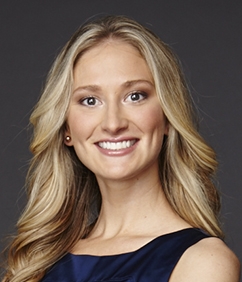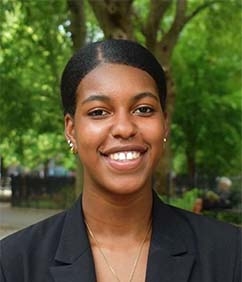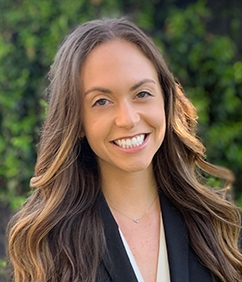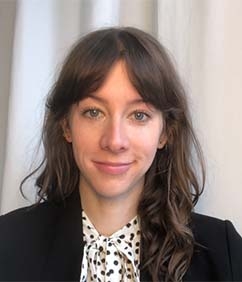Graduates explain how the Birnbaum Women’s Leadership Network helped them build networks of support in their legal careers
One student was matched with a mentor who serves as an assistant director at the American Civil Liberties Union; another regularly met for coffee with the deputy chair at a Big Law firm; still another recalls the encouraging phone calls she got during the week of a major job interview from a vice chairman and former vice president and general counsel of a multinational corporation. Each of these students were members of the Birnbaum Women’s Leadership Network (BWLN)’s first graduating class of Women’s Leadership Fellows.
Mentorship and building connections are a key part of the BWLN’s offerings. Founded in 2017, the BWLN launched the Women’s Leadership Fellows Program a year later to provide Fellows with specialized training in professional development, communication, and other skills to help women to advocate for themselves and become leaders in their communities.
Students apply early in their first year, and the fellowship kicks off in January, just before the second 1L semester begins, with the weeklong Sara Moss Women’s Leadership Training Program, also known as the intensive. During the intensive, Fellows take a strengths inventory, are paired with an alumni mentor, work individually with a communications expert on interview and speech preparation, and engage in discussions about potential obstacles that women face in the law and how those obstacles can be combatted and overcome. Afterward, the Fellows continue to meet with each other, with BWLN staff, with their alumni mentors, and with other women in the law, building networks of support throughout their time in law school and beyond.
In 2021, the first group of BWLN Fellows graduated. NYU Law spoke to four of those ten Fellows about the fellowship’s impact on their time in law school and their initial career steps.
Amanda Gonzalez Burton ’21
I came into law school with a lot of work experience, having worked most recently as an entrepreneur and in both the corporate and public sector before that. I knew that my career interests were somewhere at the intersection of business and law. I think because I was entrepreneurial, developing leadership skills seemed really important to me during my time in Law School.
On a personal note, I am a mother and I had children even in my previous career. Some of the things that I experienced were barriers either because I’m a woman or I have a family, and I think I was not consciously processing the ways that had played out in my career before law school. One of the big things that the BWLN fellowship has given me is the community of fellows to discuss shared experiences. Both to understand how we’re experiencing things as individuals, but in the broader context of the experience of women in any career. I came to realize that if you don’t share what your experience is like and build networks of support, it’s really hard to make change, particularly to make environments more hospitable to people who have historically been excluded.
My mentor was Valerie Radwaner ’87, deputy chair at Paul, Weiss, Rifkind, Wharton & Garrison, who is also just an incredible example of how you can be a really strong leader in the legal profession and also have a family. I talked with her a lot about her experiences in the industry and leading up to my Early Interview Week to help prepare before eventually accepting a position at Cooley.
When I think back on my Law School experience, I feel really fortunate to have been given such a rare opportunity to focus on myself as a professional and as a leader and hopefully a future trailblazer in the legal profession.
Frances McDonald ’21
When I was deciding between law schools, one of my close friends from undergrad, who was also an athlete with me (I played volleyball at the University of Chicago) and another Black woman, told me that her mentor, this woman named Sara Moss [‘74], was an alumna of NYU Law and that I should talk to her while I was visiting the school. So I emailed her, and she responded immediately and invited me to come to her offices at Estée Lauder [where Moss serves as vice chairman and previously served as executive vice president and general counsel] and have breakfast with her and chat. She told me all about the BWLN fellowship program she was helping to start and how excited she was, and I remember being very impressed with this woman who sat on NYU Law’s board of trustees and was an accomplished attorney, who had just spent all this time trying to help me.
I had been the captain of my volleyball team in college, and I had always considered myself to be a leader, which is why I’d never really been involved in anything like the BWLN before. Sara helped me to understand that being a leader goes outside of holding a particular title or being in a specific context where there is a designated leader. She helped me understand that leadership comes from how you handle the room, how you move things forward, how you help those around you move forward as well.
During the week-long intensive, we talked about cultivating a mindset where you are always challenging yourself to grow and to think of obstacles as circumstances in which you get to cultivate growth. And I looked around at all this huge group of amazing alumnae in the room who had come to talk about their careers, and who had accomplished all these successful things, and I recognized that they had done that work. They’d focused on their growth.
I had come to law school intending to work in criminal justice, but after the intensive, I thought I should take some classes that would encourage my growth, so I took a corporations course and a course in finance and accounting and I surprised myself because I really fell in love with that kind of work. It changed my mind about what I was doing, and now I’m practicing Big Law, which I find so interesting and compelling in ways I couldn’t have imagined.
Zoe Ridolfi-Starr ’21
As a woman and an LGBT person, I knew when I entered Law School that I was particularly interested in doing work that focused on those issues, but also exploring in a more internal way: What is it like to move through the profession as a person holding those identities? What unique obstacles might we face? And what unique potential and contributions can we make because of our specific experience and our perspective?
Throughout my time at Law School, the BWLN created a space that encouraged fellows to be vulnerable and open, but to also be supportive, and kind, and collaborative. It created a space where we were able to be unapologetically ambitious and where expressing vulnerability was not antithetical in any way to being ambitious. That combination, a space that can hold room for one’s vulnerabilities and also encourage one’s greatest ambitions, is so unique and so special. I did not expect to find that in law school.
During the Sara Moss Women’s Leadership intensive, I was matched with a mentor who is an assistant director at the ACLU, who has brought some of the cases about LGBT rights that I had been learning about in law school at the time. She has been extremely supportive and helpful throughout my time during law school and since, particularly in mapping what different paths might look like to get where I wanted to go professionally and helped me take steps towards those goals.
I am currently on a clerkship, and much of what I do now was impacted by my time in the BWLN. It impacts the way that I speak up, even though I’m brand new—I’m the youngest in the chambers and the least experienced by far—but I have an attentiveness to the way I communicate because of my fellowship.
Stephanie Wuenscher ’21
Before law school, I worked in direct services, primarily offering supports for adults with developmental disabilities. I kept running into these huge policy issues and eventually concluded that law school would equip me with skills to get people better access to resources. After getting into NYU Law, I went to an admitted students event that was sponsored by the BWLN. I remember being moved by the people that spoke and inspired by what they had done with the opportunities NYU Law afforded them. After that event, I was convinced I wanted to choose NYU Law and also that I wanted to be involved in the BWLN.
The week-long intensive included a lot of both practical skill building, like resume workshops and tutorials on salary negotiations, but also was a great way for women to connect after a first semester of Law School, when we have a sense of it. My cohort remains one of the best parts of my legal experience.
One of the most valuable parts of the training was working with the communications expert, K.M. Zouhary, who the BWLN brings in as a consultant. Not just during the intensive, but over the next three years, I worked with her to prepare for interviews, for ways to advocate for myself, and all sorts of other things. She coached in this incredibly personalized way that helped maximize your strengths without minimizing weaknesses. She would help you find a way to see how everything could be a strength, even things traditionally considered weak, like emotionality in legal settings.
With [BWLN assistant director] Claire Whitman and [executive director] Abby Seidner, we would hold group sessions about topical things that the cohort wanted to discuss, like mental health or time management, for example. I would also talk to my alumni mentor about things like this, like how she balances her work with other aspects of her life. Basically, BWLN provided a huge network of support. The process of the whole center, even on an administrative level, reflects their values. Abby and Claire are extremely thoughtful and were always asking for feedback on how different programming worked for us.
I’m now an assistant district attorney in Brooklyn. It’s definitely a job BWLN helped me to attain both through interview prep and career counselling, but also through my cohort. After I had an interview that I thought I did poorly in, I messaged my cohort and they shared their experiences and advice and helped me to be better prepared for my next interview. Basically, they taught me how to be resilient and not take a bad experience personally, but to grow from it and to learn what skills I need to develop to do better next time. I think that’s really a valuable skill for any career.
These interviews have been edited and condensed.
Posted April 21, 2022.





